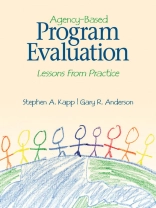This text aids both students and practitioners in articulating the elements of program evaluation, deepening their understanding of the contextual issues that surround and shape an evaluation. Authors Stephen A. Kapp and Gary R. Anderson offer readers details on the application of useful and accepted evaluation methods. It also shows readers how to make sound decisions in balancing techniques and strategies with the realities of the agency environment.
Key Features
- Ethical considerations related to collecting data from service consumers and working with agency personnel
- Strategies for accommodating cultural and ethnic differences when collecting program evaluation data
- Techniques for engaging agency personnel and key constituents in the entire evaluation process
Accompanied by robust ancillaries
This text is accompanied by a robust companion site.
The password-protected Instructor′s Site features:
- Sample Syllabi
- Power Point Slides
- Test Bank
The open-access Student Study Site offers:
- Quizzes
- Journal Articles
- Web Resources and Activities
This text is designed for upper-level undergraduate and graduate courses in program evaluation within departments of social work, mental health, and human services. It is also a great resource for practicing professionals, supervisors, and managers.
Tabela de Conteúdo
Introduction: The Purpose of This Book
Ch 1. Making the Case for Program Evaluation
Ch 2. Steps in Program Evaluation
Ch 3. Ethics and Program Evaluation: Applying a Code of Ethics to Field-Based Research
Ch 4. Ethical Challenges for Evaluators in an Agency Setting: Making Good Choices
Ch 5. Agencies and Academics: The Social and Political Context of Program Evaluation
Ch 6. Cultural Competency and Program Evaluation
Ch 7. Program Definition: Using Program Logic Models to Develop a Common Vision
Ch 8. Program Description: Evaluation Designs Using Available Information
Ch 9. Evaluation Design: Options for Supporting the Use of Information
Ch 10. Evaluation Design: Group Designs and Methods
Ch 11. Evaluation Design: Qualitative Designs and Applications
Ch 12. Consumer Satisfaction
Ch 13. Dissemination: Spreading the News
About the Authors
Sobre o autor
Gary R. Anderson, MSW, Ph D, is the Director of the School of Social Work, College of Social Science, at Michigan State University. He came to Michigan State University from Hunter College, City University of New York (New York, New York). At Hunter, he was a Professor and the founding Director of the National Resource Center for Permanency Planning. Dr. Anderson has written a number of books and articles on policy and practice related to children and families. His most recent book, Widening the Circle: The Practice and Evaluation of Family Group Conferencing with Children, Youths, and Their Families, was just released by NASW Press. He is the Editor of the journal CHILD WELFARE. He has had over twenty funded projects addressing aspects of child welfare, and is currently leading projects on child welfare worker recruitment and retention, and research related to alternative dispute resolution strategies. He has just completed a three-year term as a board member of the National Association of Deans and Directors of Schools of Social Work, and serves on three journal editorial review boards. He received his Ph D. from the School of Social Service Administration at the University of Chicago, and MSW from the University of Michigan.












